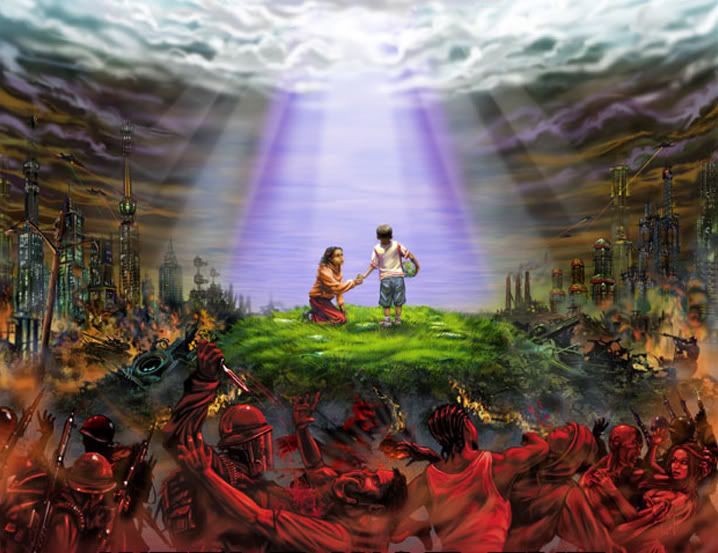

When one hears the term,
“alternate reality”, one might think of a different world, or a subconscious
level of living like a dream state. Others may think of a completely different
state of existence from their current one, while those that are more
technically inclined, may think of alternate or fractured timeline changes due
to a different choice or interference (directly or indirectly) in the space
time continuum (some of you trekkers out there love that last one I’m sure).
What’s interesting is that of late in Hollywood, many movies have taken on the
form of storytelling by adding on to various degrees of an alternate reality
(A.R for short) in its content.
This is especially true with
a lot of films within the past decade, even when the genre or demographic of
the film differs to the typical A.R. within the movie. One good example of this
would be “The Time Traveler’s Wife”, a romantic themed film with an
interesting AR twist, which came out in mid 2009. In a nutshell, the storyline
is about a man, due to an unusual accident, travels back (and later on forward)
in time to certain key events in his life as well as certain people though be
it out of his direct control of when he jumps in time. One particular person,
the love interest, he is drawn to the most and visits her the most during his
travels, but the relationship becomes strained due to his uncontrollable
movements in time. Personally I haven’t seen this film in full, (for obvious
reasons, lol) but a friend of mine (female of course) mentioned it to me when I
was telling her I was planning to write a bit about this topic. In any case
this would be one example of an A.R. theme found (to some degree) in a film
genre you would normally never see it in.

There are more apparent films that do take on the AR theme in a more direct manner while in some degree keep the potential of the AR existing within the sub plot reality of the movie’s storyline. Some obvious films would include, The Matrix trilogy, ExistenZ, Avalon, Tron, Pan’s Labyrinth, The Chronicles of Narnia (at least the first 2 films), Avatar, and most recently the film Inception. Although each of these films does differ significantly from each other in plots, the A.R. themes are consistent. In each of these films, there’s the proposal of a potential new form of existence, within the current existence of the film’s initial storyline. Interestingly enough, many of the characters of many of these films, are more than willing to give up their current existences for the new A.R.s, now why is that? Why it that characters like Cypher in Matrix 1 is was so willing to being “replugged” back into the matrix (and sell out his fellow crew) rather than face the reality of what the world was at that time? Why is it that the Peneves children from The Lion, the Witch and the Wardrobe, decided to extended their stay in Narnia when they could have gone back through the wardrobe right after the battle with the white witch was over? (Yes technically they did eventually go back, but they all did have a strong desire to return to Narnia later on, which they did). Why was Mal (of the movie “Inception”) so convinced that she was still dreaming that she was willing to stay in the limbo level of subconscious with her husband? Is the ideal of the A.R. more fulfilling than the reality of today?
This preference to A.R. over R.L. (real life) is not just limited to movies and Hollywood entertainment, the video game industry is a multi-million one, consisting of various games of all types for all ages. This is especially true with the introduction of online gaming, which came into being near the end of the 90’s, and has become the largest and most popular form of video game play today. With that, in mind, massively multiplayer online role-playing game (MMORPG) is considered to have the largest of participants with avid, casual, and even novice, players. Why do I bring this up? Well, as of late, many of these MMORPG type games make up an unusually large percentage of those who play, create or are directly involved in video games. The past decade to now in particular, has seen the population of gamers increase substantially. Many believe this is the result of older gamers playing more complex games (such as MMORPG’s), the availability of better technology for these games, plus the easier accessibility for online game play (like the various game consoles and current computers) make it easier and vividly more feasible to immerse ourselves in these new online realities. Some of the more popular games of this caliber include “Second Life”, “The Sims”, “Guild Wars”, “Everquest” and (er) “World of Warcraft”. As you can imagine, some of these games mentioned can become quite addictive...I should know.
In regards to this addictiveness of these games and the attractiveness of the various themes of A.R we see in films, is there ever a time when what we find so fascinating about these A.R. could divulge into an obsession? Technically speaking, anything we put into ourselves as an over-indulgence is never good, in any form or fashion. But alas we are flawed creatures of flawed habits in world far from perfect. Remember that article about the after affect many had after seeing the movie Avatar? (See Avatar review Prt.1 & Prt 3) Well it seems from a visual scale, many felt depressed after experiencing the vibrant flora and fauna of Pandora (in 3-D no doubt) while coming back to reality in comparison to the less then vibrant-ness of world today.
Here's a clip of this here: http://www.youtube.com/watch?v=PcL5Wghm7-s
But why do we have this need to be caught up in an A.R.? Why it is many of us love to immerse themselves in our own creative imagination based on outlets ranging from online gameplay, HD movies, or even a really well written novel? Perhaps for us as a people, there is a deep desire to seek out more than what we see in our own world of 9 to 5 day to day routine of living. Perhaps those of us need a break from reality that many cannot always deal with at times. Or just perhaps, deep within our own subconscious thoughts, we feel there is more our current existence, that we try to seek out in our own ways.
One of my favorite books of the Bible is Revelations, particularly Chapter 21. This chapter was on my mind when writing this. Verse 1: “Now I saw a new heaven and a new earth, for the first heaven and the first earth had passed away.” Verse 2: “Then I John saw the holy city, New Jerusalem, coming down out of heaven from God, prepared as bride adorned for her husband.” Now, how’s that for an Alternate Reality?
Now I’m not planning to turn this into a moment to preach. That being said, I do think we as a people, (regardless of religion or beliefs) do have a hidden desire to seek out something greater than our current existence. This might be the reason why many of us get so enamored with the latest form of technology, entertainment media, or with our own creative imaginations. Perhaps we have an inherent desire to seek out these A.R.’s because we on a subconscious level know that there is more to our existence than where we are today. Think about it, considering the amount of time, preparation, and money we spend on focusing on various types of A.R.s in day to day life, it’s clear we want more than what we currently have in this plane of reality, one where “every tear from every eye is wiped away, there is no more death, nor sorrow for crying nor any more pain, for the former things have passed away”. And perhaps one day, we as a people will have the opportunity to achieve that level of existence. Here’s to hoping!












One thing to add...after seeing Tron Legacy (great moive BTW) I think "The Grid" would certianly be another variation of a Alternate Reality indeed!
ReplyDeleteJust adding one more moive mention. After seeing "Suckerpunch" this too to a slightly lesser degree is another good example..
ReplyDeleteOften, viewers escape reality through the entertainment of a movie. So, being immersed in an alternate reality is conducive to "getting away" from reality.
ReplyDeleteAlso, the use of allegory in order to convey a deeper meaning is an extension of the most primitive developmental steps of using symbols to communicate that would become written language.
And, when you consider allegory, isn't it often based on non-reality. The story of the tortoise and the hare has been conveying a timeless lesson for millenia - yet we know the original author had no expectation that his readers would think any such race had ever actually occurred.
From earliest times, allegory has been based in some hyperbole, and we're just continuing what humans have been doing for thousands of years.
Points taken..
ReplyDeleteHeres a thought on this subject I remembered when talking with a friend of mine at work..particulary about the first Matrix film...one opinion on it was "its notion of blissfull ignorance." On how some people chosse the truth even though it can cause sadness. While others would be more willing to live a life of illusion and lies....Opinions on this?
ReplyDeleteGreat thought (as always). Two ways to look at it come to mind at this moment.
ReplyDeleteEcclesiastes 7:2-4 talks about it being better to go to the house of mourning than the house of feasting, that sorrow is better than laughter, and that the heart of the wise is in the house of mourning while the heart of fools is in the house of mirth."
Life is, or should be, taken seriously. Contemplating the realities of life shouldn't be passed up in favour of always seeking "good times."
However, the Preacher does value balance over excess.
Ecclesiastes 1:18 reads "For in much wisdom is much grief: and he that increaseth knowledge increaseth sorrow" which was a realization of the vanity of seeking too much knowledge, which he considered an exercise in vanity, a waste of time, from the previous verse 17.
Other contributions to this thought include Ecclesiastes
- 7:16, "Be not righteous over much, neither make thyself over wise: why shouldest thou destroy thyself?"
- 12:12, "...be admonished, my son: there's no end to writing many books, and much study is a weariness of the flesh."
To which Cypher might agree, saying "Why, oh why, didn't I take the blue pill?"
So, while it's important to be serious and face reality, it's also important to lighten up once in a while. It's all about balance, neither extremes of either stripe are good.
But another "ignorance is bliss" idea comes from the confidence of youth. I had recorded two albums and written and self-published a book by the time I was 25 - because I was too young/ignorant to know "I couldn't," I just went ahead and did it. Now, I'm a little older and have learned fear and limitations and so I'm nowhere near as aggressive...and realize that the ignorance of youth helped me get things done and I might have to tap into some of that in order to get on with what still lays before me to be done.
This could be part of the idea behind Jesus saying "unless you become as little children, you shall not enter the kingdom of God." It takes a faith and trust that are not hinged to too much knowledge in order to follow God. Too much intellectuality can put us in the position to think we can question God and think through things when what's before us to be done defies logic as our mortal brains are able to grasp.
Anyway, the issue here is, there's value to blissful ignorance, IF it helps us step up into our calling. However, ultimately, life is serious and we ought to be spending more of our time in sober reflection and taking care of our business rather than always looking for the party (has anyone seen the movie Life with Eddie Murphy and Martin Lawrence? It's easily one of Murphy's best, if not his best, and speaks very heavily to this discussion).